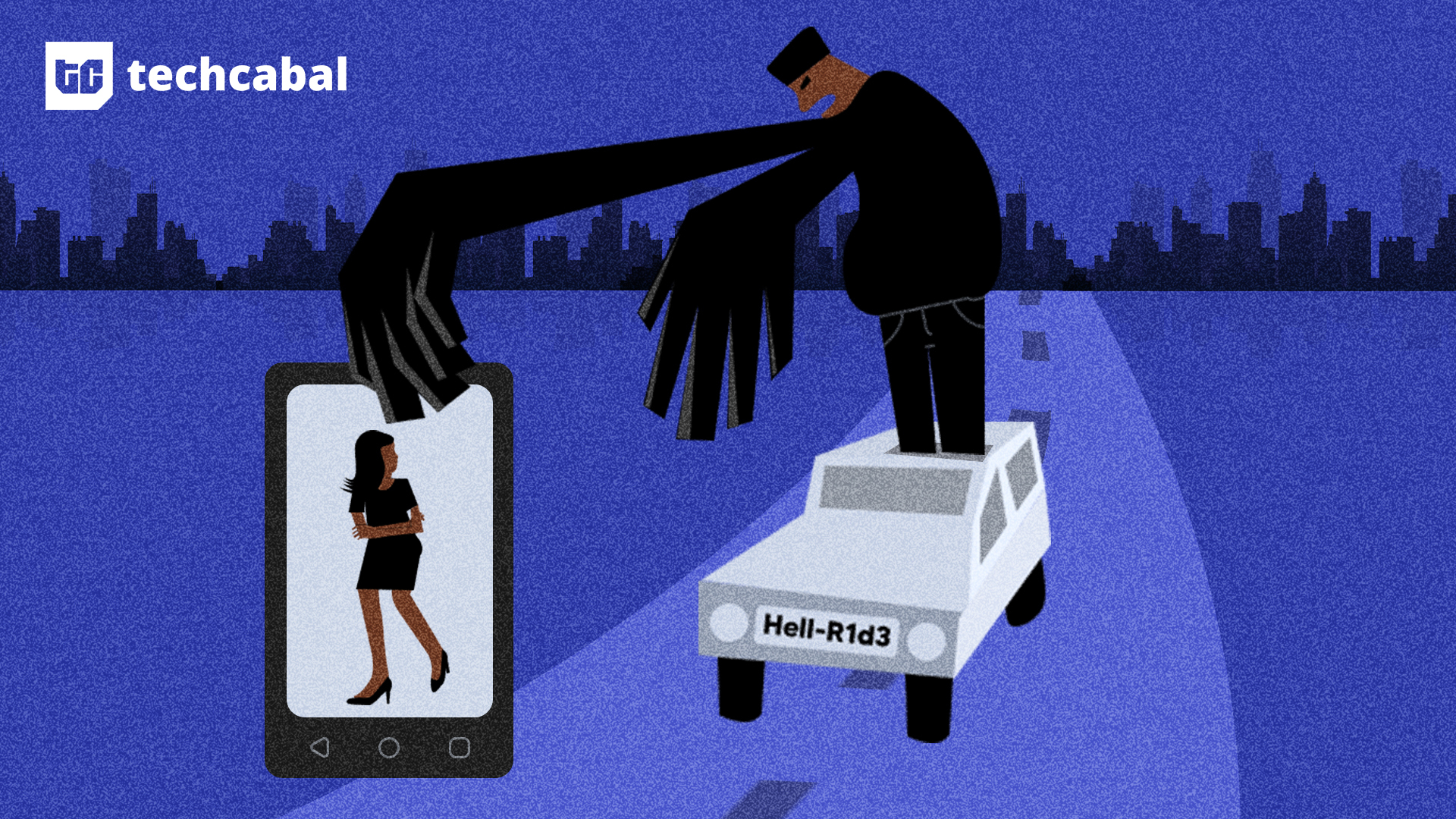Many Nigerian women are stalked by drivers after using ride-hailing apps, as ride-hailing companies try to evade responsibilities.
Late one night in September 2022, Ebube, a 23-year-old law professional, flew into Lagos from Abuja and, unable to get an Uber, booked a trip on Rida, another popular ride-hailing app in Nigeria. After several failed transactions, she discovered the next day that she’d paid him three times the fare. She contacted the driver, a man called Kehinde Ladi, for a refund, which he promised to send. What Ebube got instead was several months of constant calls and messages on WhatsApp from different numbers every other day. Ladi, who soon left Nigeria, uses new numbers to call Ebube several times despite her forgoing the money. Blocking him hasn’t stopped him. Complaining to Rida did not help the situation. A full year later, Ebube still gets WhatsApp messages from Ladi.
This is just one of many examples of cyberstalking that female passengers are subjected to after booking and going on trips with ride-hailing apps. These experiences affect the way women interact with these apps. Binyelum*, a 28-year-old lawyer who lives in Lagos and has been using ride-hailing apps for five years, has had to change her name on all the apps to a generic one because she was constantly harassed in-ride due to her unusual name. She changed her name on ride-hailing apps to avoid being stalked on social media by drivers. For Bola*, a student at the University of Lagos, this fear became a reality as a driver from Bolt used several Instagram accounts to hound and sexually harass her. Jessica* also faced the same problem after an Uber ride home from her office in Lagos, with the driver physically stalking her at work.
Data protection lawyer Victoria Oloni, explained that Nigeria’s Cybercrimes Act of 2015 establishes criminal liability for various forms of cyberstalking, such as persistently sending offensive, indecent, obscene, or menacing messages via public electronic communication networks, which the activities of the ride-hailing drivers fall within. “Sending false messages, and causing annoyance, inconvenience, or anxiety to another person all fall within the reach of cyberstalking,” Oloni said.
While the companies in charge of ride-hailing apps set up safety measures to protect riders, it is not enough.
To protect users’ privacy, popular ride-hailing apps like Bolt and Uber have phone number masking features that enable riders or drivers to call each other in-app without revealing their phone numbers. However, there is also an option to place a mobile call to the SIM number of the user. On other ride-hailing platforms, often less expensive, like inDrive and Rida, users can only call directly on mobile. They reveal users’ phone numbers immediately after you press the call button. This is how stalkers can save the numbers to their devices and use them to contact and harass users.
A spokesperson for Uber told TechCabal, ”We encourage riders and drivers to use in-app communication and not give their private details to ensure safety and privacy at all times.”
Bolt explained to TechCabal that it does the same but finds it necessary to include the option of direct contact in cases where the internet connection is unstable, which is sometimes the case. “We constantly issue driver training materials to inform our drivers not to abuse this function. Any contact leads to immediate action against drivers or riders,” Bolt said in an email to TechCabal.
On the one hand, cyberstalkers may be fined between ₦7 million and ₦25 million and imprisoned for at least a year; on the other hand, according to Oloni, the absence of explicit reporting mechanisms for victims is a notable gap within the Cybercrimes Act. “While there is a cybercrime reporting portal established by the Nigerian Police Force (NPF), we all know the challenges associated with the effectiveness of the NPF,” Oloni explained. “Notably, the Act only outlines how law enforcement entities address these offences, rather than how these agencies can become aware of the occurrences of such offences.”
The ride-hailing companies often try to shift responsibility to the users, especially for stalking that happens after the ride. Additionally, there are arguments on whether ride-hailing drivers are employees of these companies or not. However, ride-hailing companies are service providers under the Cybercrimes Act and have a responsibility to aid law enforcement agencies in dealing with stalking and harassment and protecting data that’s sourced on their platforms.
Oloni told TechCabal that non-compliance by ride-hailing services could result in potential liability. “Upon conviction, ride-hailing services can be fined up to ₦10 million,” she said. Additionally, any director, manager, or officer of the service provider can be imprisoned for a minimum of three years or fined at least ₦7 million, or both.
In the future, a cyberstalking victim may seek recourse in a court of law, and both the ride-hailing apps and their drivers might be coughing up a lot of money and some jail time. But for now, unfortunately, the status quo remains.
Oloni suggested that a possible solution is creating a shared reporting database among ride-hailing apps. This way, deplatformed drivers cannot rejoin under different services due to prior behaviours being flagged. One wonders how long it might take the ride-hailing companies to consider this and create an extra layer of safety for female users.
Have you got your tickets to TechCabal’s Moonshot Conference? Click here to do so now!

























